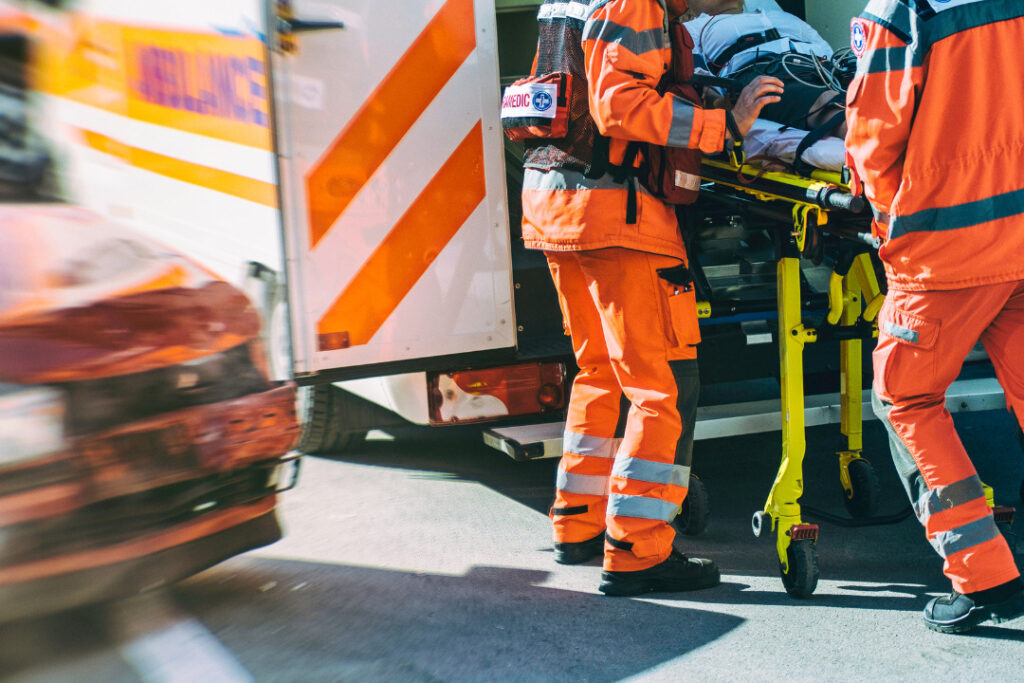
Most hospitals have an emergency department, where patients with emergent injuries and illnesses can be treated without an appointment. Some of these patients may have life-threatening symptoms, such as chest pain, shortness of breath, or severe stomach pain, and the emergency medicine team can provide the treatment necessary to support care for these patients.
However, many hospital emergency departments are not equipped to deal with traumatic injuries like those suffered from a car crash, serious fall, severe burn, gunshot, stab wound, or other serious injury. When it comes to traumatic injuries, a trauma center is the appropriate level of care and the journey to effective treatment and the care journey starts with first responders.
The Importance of First Responders
Care often begins before the patient enters the hospital. First responders might not be part of the official trauma team, but they can play an important role in the patient’s fate. Paramedics and other first responders will evaluate the patient’s condition and determine if they can be treated at a regular emergency department, or if they require care at a trauma center.
Medically trained responders, including paramedics, police officers, firefighters, and more, are often the first to interact with a patient who has suffered a traumatic injury. Stopping a patient’s bleeding – the top priority in most trauma situations – and stabilizing the patient for a trip to the hospital are among the first responder’s top priorities.
Time is crucial when it comes to treating traumatic injuries and high-quality pre-hospital care takes advantage of every moment to provide care for the patient until the patient can transition to the care of the hospital team. The golden hour, a well-known concept in the medical field, refers to the initial time after someone experiences a traumatic injury and the care they receive. It starts in the field and continues throughout the transition to the higher level of care, and it can drastically affect a patient’s outcome.
Trauma Team on Standby
Trauma is a natural and important offshoot of the broader realm of acute or emergency care. Trauma centers are typically located within hospitals, often in the emergency department. At trauma centers, you’ll find highly trained clinicians – trauma surgeons, neurosurgeons, orthopaedic surgeons, cardiac surgeons, radiologists, trauma nurses, and support technicians and staff – at the ready 24/7. They have access to resources such as an operating room, resuscitation area, laboratory, and diagnostic testing equipment.
What happens in the trauma center will decide where the patient goes next: either for more testing and scans, to the intensive care unit (ICU), or directly to the operating room. In a patient’s initial procedure, the surgeon will aim to stop bleeding and fixing the initial, life-threatening injuries. After that, the patient will go to the ICU for more stabilizing and resuscitation before potentially going back into surgery later for more thorough repairs.
The Long Recovery
Traumatic injuries often involve long recovery periods and a systemic approach across services and facilities working together to provide comprehensive care. Recovery is often categorized in phases.
- Phase 1 — Trauma occurs in several different ways and there is no “one” way that it affects victims. When you are discharged from the hospital, this is the time to continue your doctor’s orders and begin physiological recovery. Situations that never used to bother you might now trigger anxiety and foster unhealthy coping methods. An expert of mental health can help you find your way back to a sense of safety during this time.
- Phase 2 — Once you begin to feel stable again, you will be encouraged to process what you have gone through. This is important as the mental healing occurs concurrently with physical healing. Acknowledging the mental effects in a safe environment of any physical setbacks during recovery will make you even stronger and give you the skills necessary to cope and rebuild.
- Phase 3 — After going through physical and mental recovery, you might have a new perception of life. In order to move forward after trauma, you must come to terms with your new reality. To make this possible, rehabilitation experts and your mental health specialist will help you achieve this new sense of empowerment.
Across all phases, the focus in on the patient’s needs and desires and a successful recovery requires the careful coordination of support and services.
A Special Field
Being on a trauma team is taxing work and a successful trauma team requires certain characteristics. Trauma cases can change quickly and physicians, nurses, and other personnel who work those cases must be nimble enough to address any change. Critical thinking, staying calm under pressure, and being able to adapt and make decisions quickly are critical skills. The work is challenging, but necessary, as trauma care teams save lives every day.
Ronen Elefant, M.D., MBA, FACS, is a trauma surgeon and medical director of UPMC Trauma Care at UPMC Williamsport. As a Level II Trauma Center, UPMC Williamsport is part of the UPMC Trauma Care System, one of the largest trauma systems in Pennsylvania and one of the most comprehensive trauma systems, by scope and depth of services, in the nation. For more information on UPMC Williamsport’s Trauma Care services, visit UPMC.com/TraumaNCPA.




